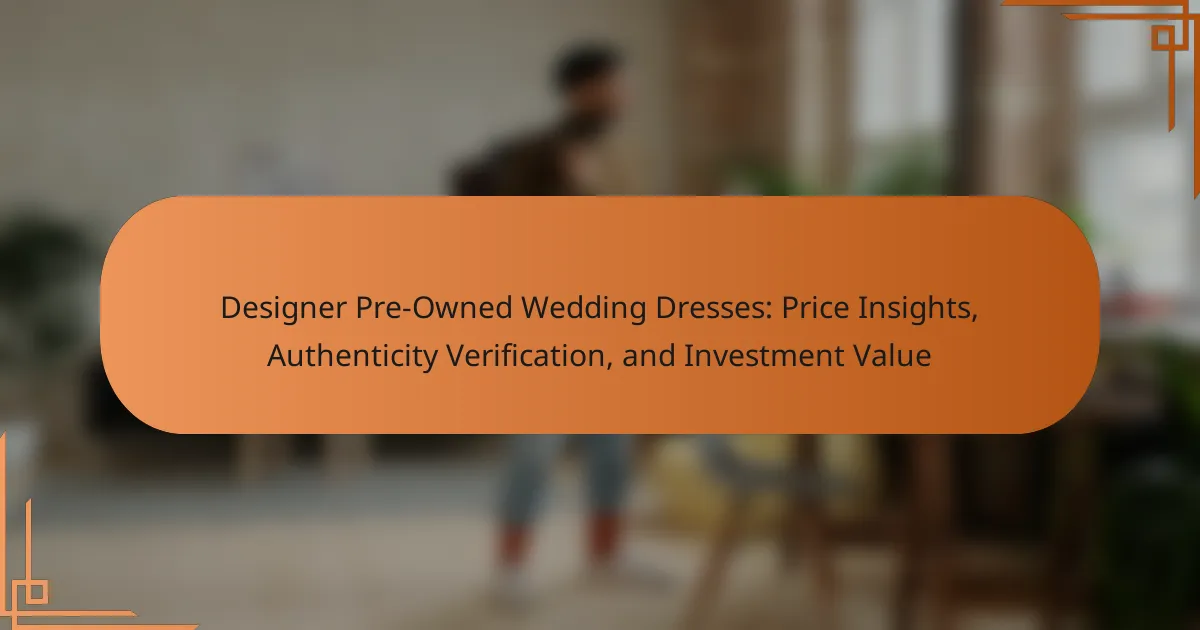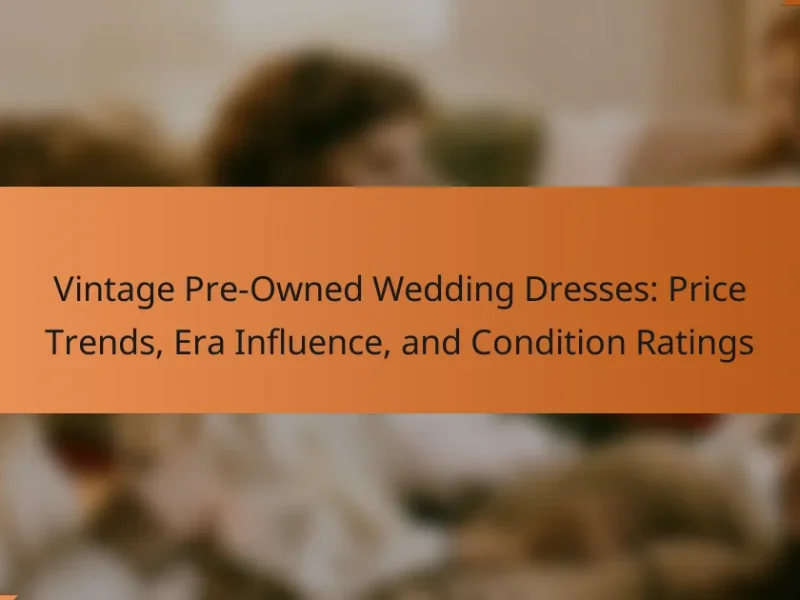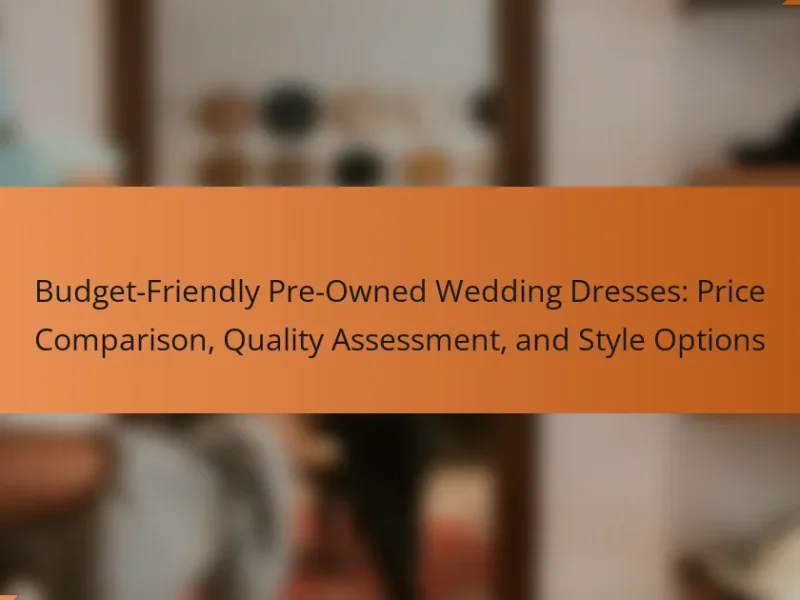Designer pre-owned wedding dresses are previously owned bridal gowns from reputable designers, offered at lower prices than new gowns. This article provides insights into the pricing of these dresses, which typically ranges from $500 to $3,000, influenced by brand, condition, and market trends. It also covers the importance of authenticity verification, detailing methods such as examining labels, tags, and consulting reputable resale platforms. Additionally, the article explores the investment value of these dresses, highlighting their potential resale prices and the growing market demand driven by sustainable fashion.
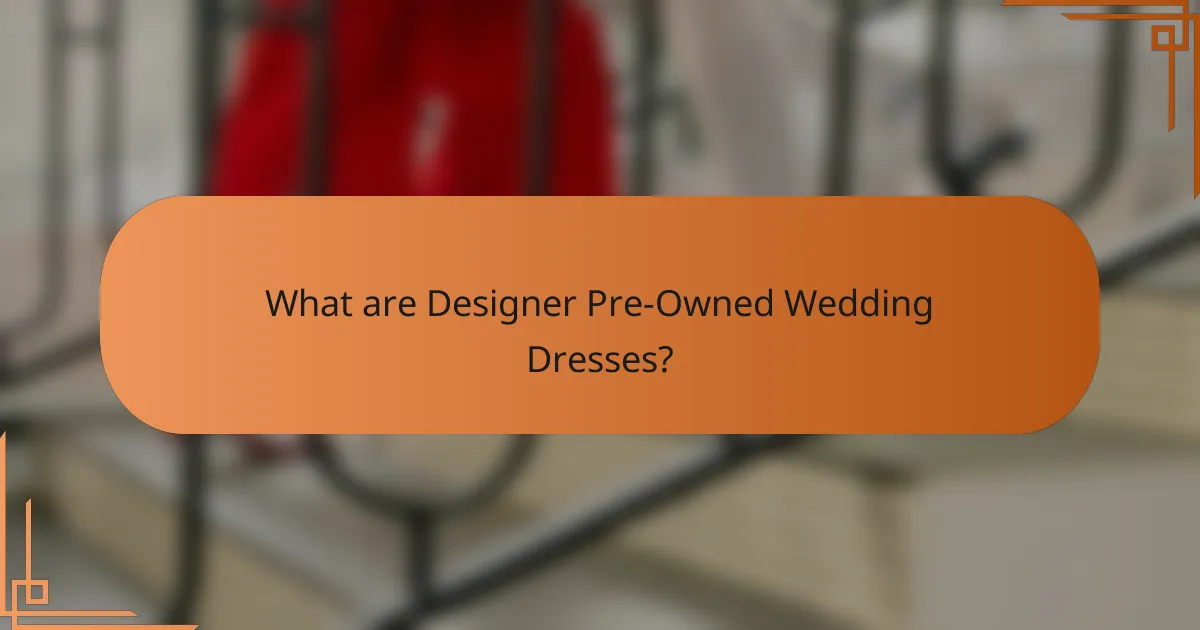
What are Designer Pre-Owned Wedding Dresses?
Designer pre-owned wedding dresses are previously owned bridal gowns from renowned designers. These dresses are often sold at a lower price compared to new ones. They may be in excellent condition or slightly worn. Many brides choose pre-owned dresses to save money or find unique styles. The market for these dresses has grown due to the increasing popularity of sustainable fashion. Authenticity is typically verified through tags, receipts, or certificates. Many online platforms specialize in selling designer pre-owned wedding dresses. This option allows brides to access high-quality gowns that may no longer be available in stores.
How do Designer Pre-Owned Wedding Dresses differ from new dresses?
Designer pre-owned wedding dresses differ from new dresses primarily in their pricing and availability. Pre-owned dresses often cost significantly less than new ones, making them an attractive option for budget-conscious brides. The condition of pre-owned dresses can vary, with some being gently used while others may show signs of wear. New dresses are typically made to order and can be customized to the bride’s specifications. In contrast, pre-owned dresses may have limited sizes and styles available. Additionally, pre-owned dresses may carry unique histories and character that new dresses lack. The resale market for designer pre-owned dresses has grown, with many brides seeking sustainable options. This shift reflects a broader trend toward eco-friendly choices in fashion.
What qualities define a designer wedding dress?
A designer wedding dress is characterized by high-quality materials, expert craftsmanship, and unique design elements. These dresses often feature luxurious fabrics such as silk, satin, or lace. The craftsmanship includes detailed stitching and intricate embellishments. Unique design elements may include custom silhouettes or personalized features. Designer wedding dresses often come from renowned fashion houses, ensuring exclusivity. They typically reflect current fashion trends while maintaining timeless elegance. The brand reputation adds to the dress’s value and desirability. Many designer dresses also offer a perfect fit, thanks to tailored sizing options.
What are the common brands associated with designer wedding dresses?
Common brands associated with designer wedding dresses include Vera Wang, Pronovias, and Monique Lhuillier. These brands are renowned for their unique designs and high-quality craftsmanship. Vera Wang is particularly famous for its modern and romantic styles. Pronovias offers a wide range of elegant and sophisticated gowns. Monique Lhuillier is known for its luxurious fabrics and intricate detailing. Other notable brands include Amsale, Hayley Paige, and Jenny Packham, each contributing distinct aesthetics to the wedding dress market.
Why choose a pre-owned wedding dress?
Choosing a pre-owned wedding dress is a sustainable and cost-effective option for brides. Pre-owned dresses often come at a significantly reduced price compared to new ones. This allows brides to access designer gowns that may otherwise be out of their budget. Additionally, purchasing a pre-owned dress contributes to environmental sustainability by reducing waste in the fashion industry. Many pre-owned dresses are in excellent condition, having been worn only once. Brides can also find unique styles that may no longer be available in stores. According to a study by The Knot, 63% of brides consider budget as a primary factor in their wedding dress choice. This trend highlights the growing popularity of pre-owned options among budget-conscious brides.
What are the environmental benefits of buying pre-owned?
Buying pre-owned items significantly reduces environmental impact. It minimizes waste by extending the lifecycle of products. This practice conserves resources by lessening the demand for new materials. Manufacturing new items often involves high energy consumption and emissions. For instance, producing a single cotton shirt can require up to 2,700 liters of water. Purchasing pre-owned clothing also reduces landfill contributions. The EPA estimates that over 11 million tons of textiles are discarded annually in the U.S. Therefore, buying pre-owned helps mitigate these environmental issues.
How can pre-owned dresses be more cost-effective?
Pre-owned dresses can be more cost-effective due to their lower price compared to new ones. They typically cost 30-70% less than retail prices. This significant reduction is often due to depreciation and the desire to sell quickly. Additionally, pre-owned dresses may come with high-quality materials that retain their value over time. Buying pre-owned also reduces the environmental impact associated with new dress production. Research shows that the resale market for designer dresses is growing, indicating a strong demand for cost-effective options. Thus, purchasing pre-owned dresses offers both financial savings and sustainability benefits.
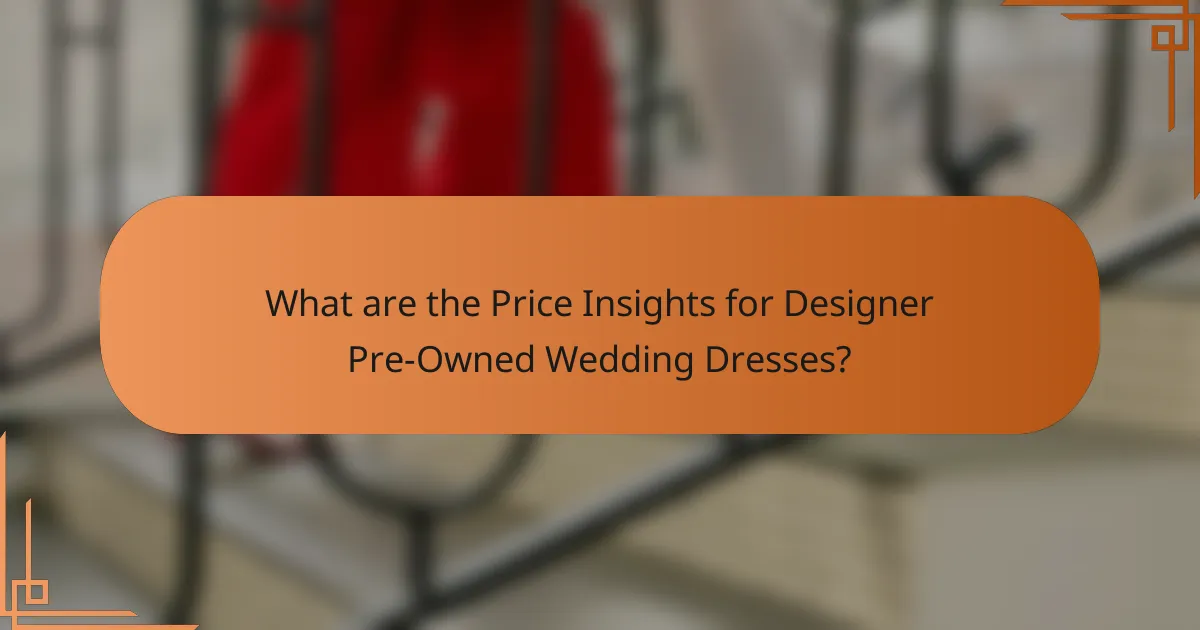
What are the Price Insights for Designer Pre-Owned Wedding Dresses?
Designer pre-owned wedding dresses typically range from $500 to $3,000. The price largely depends on the brand, condition, and original retail price. High-end designers can command prices at the upper end of this range. Dresses in excellent condition with original tags are priced higher. Popular brands like Vera Wang and Pronovias often see resale values exceeding $2,000. Seasonal trends also affect pricing, with styles from recent collections being more expensive. A study by The Knot indicates that pre-owned wedding dresses can save buyers up to 50% compared to new ones. This makes them an attractive option for budget-conscious brides.
How is the price of a pre-owned wedding dress determined?
The price of a pre-owned wedding dress is determined by several factors. Key factors include the brand, condition, and original retail price of the dress. Designer labels typically command higher resale values. The dress’s condition is assessed based on wear, stains, and alterations. Dresses in pristine condition fetch higher prices. Additionally, the original retail price influences the resale value. Dresses originally priced higher will generally sell for more, even when pre-owned. Market demand also plays a crucial role. If a style is currently popular, its price may increase. Finally, the location of the sale can affect pricing, with urban areas often seeing higher prices.
What factors influence the pricing of designer wedding dresses?
The pricing of designer wedding dresses is influenced by several key factors. Brand reputation significantly affects pricing. Established designers often command higher prices due to their prestige. The quality of materials used is another major factor. Luxurious fabrics and intricate embellishments increase production costs.
Customization options also play a role in pricing. Bespoke dresses tailored to individual specifications typically cost more. The complexity of the design impacts the final price as well. Unique and elaborate designs require more labor and time to create.
Market demand influences prices too. High demand for specific styles can lead to increased pricing. Seasonal trends may also affect how much a designer wedding dress costs. Lastly, the resale value of designer dresses can vary based on condition and market trends, impacting initial pricing.
How do seasonal trends affect the pricing?
Seasonal trends significantly impact the pricing of designer pre-owned wedding dresses. Prices often rise during peak wedding seasons, typically spring and summer. Increased demand during these months leads to higher prices for sought-after styles. Conversely, prices may decrease in off-peak seasons, such as winter. This fluctuation is driven by lower demand and increased inventory levels. Historical data shows that wedding dress prices can vary by up to 30% depending on the season. Additionally, trends in bridal fashion can influence pricing, as certain styles become more popular at different times. Thus, understanding seasonal trends is crucial for buyers and sellers in the pre-owned market.
What are the average price ranges for various designers?
Average price ranges for various designers of pre-owned wedding dresses typically vary significantly. For instance, dresses from renowned designers like Vera Wang and Monique Lhuillier can range from $1,500 to $5,000. Mid-tier designers such as Amsale and BHLDN usually fall between $800 and $2,500. More accessible brands like David’s Bridal may offer options starting around $300 to $1,200. Prices are influenced by factors like the dress’s condition, style, and original retail price. Market data indicates that pre-owned wedding dresses retain about 50-70% of their original value. This trend highlights the investment potential of high-quality designer dresses.
Which designers offer the best value in pre-owned options?
Designers that offer the best value in pre-owned options include Vera Wang, Pronovias, and Amsale. Vera Wang wedding dresses often retain high resale values due to their iconic designs and quality craftsmanship. Pronovias is known for its elegant styles, making pre-owned options attractive at lower prices. Amsale offers modern silhouettes that appeal to brides seeking contemporary looks, enhancing their resale potential. These designers have a strong market presence, ensuring that pre-owned dresses are in demand.
How do prices vary based on dress condition and age?
Prices for designer pre-owned wedding dresses vary significantly based on dress condition and age. Dresses in excellent condition command higher prices. Minor signs of wear can reduce value, while severe damage may lead to substantial price drops. Age also impacts pricing; newer styles generally attract higher demand and prices. Vintage dresses may be valued for their uniqueness, but their condition is crucial. For instance, a well-preserved vintage dress may sell for more than a newer dress in poor condition. Market trends indicate that dresses from popular designers retain value better than those from lesser-known brands.
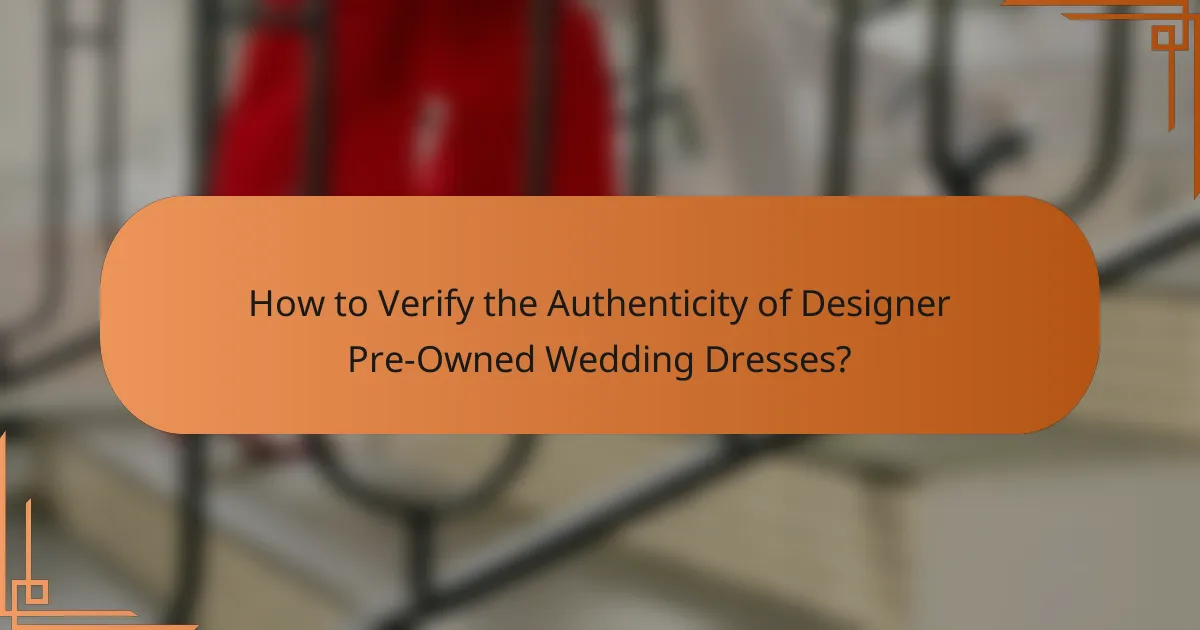
How to Verify the Authenticity of Designer Pre-Owned Wedding Dresses?
To verify the authenticity of designer pre-owned wedding dresses, examine the label and tags. Authentic designer dresses have specific labels that include brand logos and care instructions. Check for quality stitching and fabric, as genuine items are made with high-quality materials. Research the dress style and model to ensure it matches the designer’s characteristics. Look for serial numbers or authenticity cards, which are often included with designer items. Consult reputable resale platforms that offer authentication services. Seek expert opinions from professionals who specialize in designer fashion. These steps provide a comprehensive approach to confirming authenticity.
What steps can be taken to authenticate a designer dress?
To authenticate a designer dress, examine the label and tags for brand-specific details. Authentic designer dresses have high-quality labels with precise stitching. Check for a serial number or authenticity card, as many brands include these. Inspect the fabric and stitching quality, as authentic dresses use premium materials. Compare the dress with official images from the brand’s website. Look for inconsistencies in design elements or color. Seek professional authentication services if unsure, as experts can provide reliable verification. Research the brand’s specific authentication methods, as they can vary.
What are the key signs of authenticity to look for?
Key signs of authenticity in designer pre-owned wedding dresses include brand labels, craftsmanship, and provenance. Authentic dresses typically have well-stitched labels that include the designer’s name and logo. The craftsmanship of the dress should reflect high-quality materials and meticulous construction. Look for consistent stitching, lining, and finishing details. Provenance, or the dress’s history, can be verified through receipts, original tags, or previous ownership documentation. Additionally, reputable sellers often provide authentication services or certificates. These signs collectively help confirm the dress’s authenticity and value in the market.
How can one use serial numbers and tags for verification?
One can use serial numbers and tags for verification by checking their authenticity against manufacturer records. Serial numbers are unique identifiers assigned to each item. They help confirm the item’s origin and authenticity. Tags often contain additional information, such as the designer’s name and production details. Cross-referencing these details with official sources can validate the item’s legitimacy. Many designers maintain databases of serial numbers for their products. This process helps prevent counterfeiting and ensures buyers receive genuine items.
Where can you get professional authentication services?
Professional authentication services for designer pre-owned wedding dresses can be obtained from specialized appraisal companies. These companies employ experts who verify the authenticity of luxury items. Many reputable fashion boutiques also offer authentication services. Additionally, online platforms dedicated to resale of luxury goods often have partnerships with authentication specialists. For instance, sites like The RealReal and Vestiaire Collective provide authentication for their listed items. These services ensure that buyers receive genuine products, protecting their investment.
What are the costs associated with professional authentication?
The costs associated with professional authentication of designer pre-owned wedding dresses typically range from $100 to $500. This cost varies based on the authentication service provider and the dress’s brand. High-end brands may incur higher fees due to their complexity and demand for expertise. Additional costs may include shipping fees if the dress needs to be sent to a remote authenticator. Some services offer a tiered pricing model, where more detailed verification incurs higher costs. Overall, investing in professional authentication ensures the dress’s authenticity, which can significantly impact its resale value.
How reliable are online authentication services?
Online authentication services are generally reliable but vary in effectiveness. The reliability depends on the technology and methods used by the service. Many services employ advanced techniques like machine learning and expert reviews. According to a study by the International Journal of Information Security, services using multiple verification methods have higher accuracy rates. For example, some services may achieve over 90% accuracy in identifying counterfeit items. However, no system is infallible. Users should consider the reputation and reviews of the authentication service.
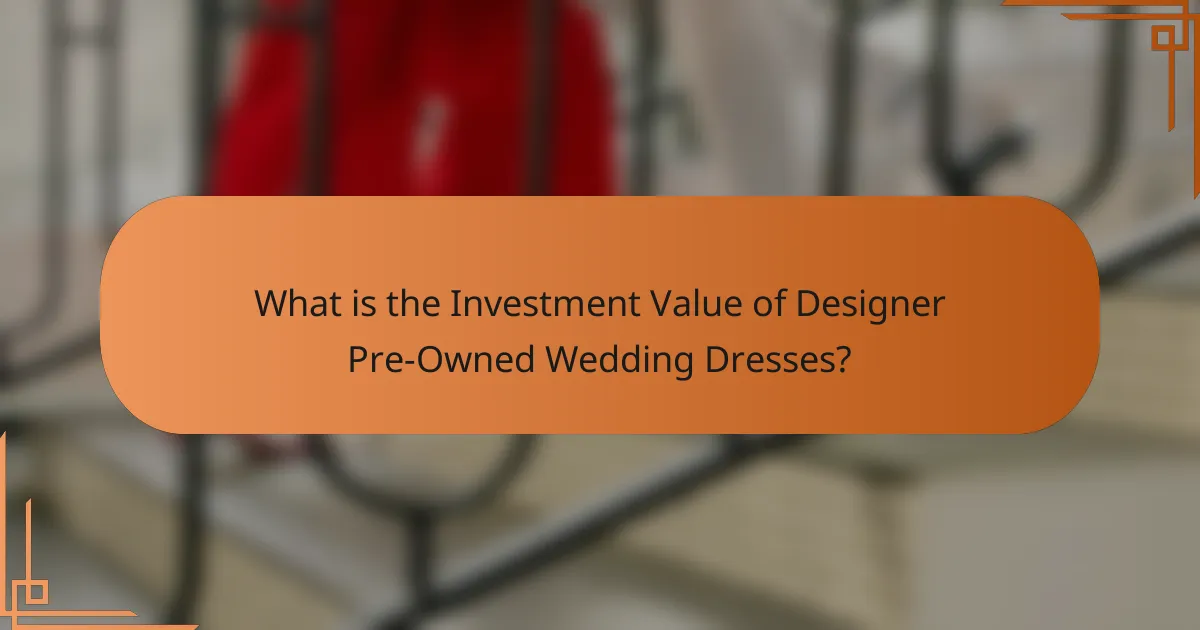
What is the Investment Value of Designer Pre-Owned Wedding Dresses?
Designer pre-owned wedding dresses often hold significant investment value. Their resale prices can range from 50% to 70% of the original retail price. Factors influencing this value include brand, condition, and rarity. Popular designer labels tend to retain value better than lesser-known brands. Dresses in excellent condition with original tags fetch higher prices. Unique or limited-edition designs are also more desirable. Market demand for sustainable fashion boosts interest in pre-owned options. According to a report by The Knot, the average resale value of wedding dresses has increased by 20% over the past five years. This trend indicates that investing in designer pre-owned wedding dresses can be financially beneficial.
How do designer wedding dresses hold their value over time?
Designer wedding dresses hold their value over time due to their brand prestige and quality craftsmanship. High-end designers often use premium materials and intricate designs, making these dresses desirable. Limited edition or discontinued styles tend to appreciate in value as they become rare. The condition of the dress significantly impacts its resale value, with well-maintained dresses fetching higher prices. Additionally, the popularity of sustainable fashion increases demand for pre-owned designer dresses. Statistics show that certain designer dresses can retain up to 70% of their original price in the resale market. This combination of factors contributes to the enduring value of designer wedding dresses.
What are the factors that contribute to a dress’s resale value?
The factors that contribute to a dress’s resale value include brand reputation, condition, and rarity. High-demand brands often command higher resale prices. The dress’s physical condition significantly impacts its value; pristine items fetch more than those with visible wear. Rarity also plays a crucial role; limited edition or discontinued styles are more sought after. Additional factors include the original purchase price, current fashion trends, and whether the dress comes with original packaging or tags. Provenance can enhance value; a dress worn by a celebrity may sell for more. Lastly, market demand fluctuates, affecting resale prices.
How can trends impact the investment potential of a dress?
Trends significantly influence the investment potential of a dress. Fashion trends dictate consumer demand and desirability. A dress that aligns with current trends may appreciate in value over time. For example, vintage styles or popular designers often see increased interest during trend cycles. According to a report by The Business of Fashion, items that reflect current fashion trends can sell for up to 30% more than those that do not. Conversely, dresses that fall out of favor may decrease in value. Thus, understanding trends is crucial for assessing a dress’s future investment potential.
What are the best practices for reselling pre-owned wedding dresses?
The best practices for reselling pre-owned wedding dresses include cleaning the dress, providing accurate descriptions, and using high-quality photos. Cleaning the dress ensures it is in the best condition for potential buyers. Accurate descriptions should include details about the designer, size, and any alterations made. High-quality photos showcase the dress effectively and attract buyers. Pricing should be competitive, reflecting the original price and condition of the dress. Using platforms specialized in wedding attire can increase visibility. Engaging with potential buyers through prompt communication builds trust and can facilitate sales.
How can one effectively market a pre-owned wedding dress?
To effectively market a pre-owned wedding dress, utilize online platforms specializing in wedding attire. Websites like Stillwhite and PreOwnedWeddingDresses connect sellers with buyers directly. High-quality photos showcasing the dress from multiple angles are essential. Clear, detailed descriptions of the dress’s condition, designer, and size help attract potential buyers. Pricing the dress competitively based on similar listings increases visibility. Social media platforms can also reach a wider audience; using relevant hashtags can enhance discoverability. Engaging with local bridal shops for consignment opportunities can further expand marketing efforts. These strategies align with market trends, as the demand for sustainable fashion grows.
What platforms are best for selling designer wedding dresses?
The best platforms for selling designer wedding dresses include Poshmark, eBay, and Etsy. Poshmark specializes in fashion resale, offering a targeted audience for wedding attire. eBay provides a global marketplace with auction and buy-it-now options, maximizing visibility. Etsy focuses on handmade and vintage items, attracting buyers looking for unique wedding dresses. These platforms have large user bases, ensuring a higher chance of sales. Each platform has features that cater specifically to fashion and bridal markets, enhancing the selling experience.
What tips should you consider when purchasing a pre-owned wedding dress?
When purchasing a pre-owned wedding dress, consider checking the dress’s condition first. Look for any signs of wear, stains, or damage. Verify the dress’s authenticity by requesting the original designer label and any purchase receipts. Measure yourself accurately and compare your measurements with the dress size listed. Research the dress’s retail price to ensure you’re getting a fair deal. Inquire about the dress’s history, including how many times it has been worn. Ask about the return policy in case the dress does not meet your expectations. Finally, consider having the dress professionally cleaned before the wedding to ensure it looks its best.
Designer pre-owned wedding dresses are previously owned gowns from renowned designers, offering a sustainable and cost-effective alternative for brides. This article provides insights into the pricing of these dresses, which typically ranges from $500 to $3,000, and factors influencing their resale value, such as brand reputation and dress condition. It also covers the importance of authenticity verification through labels and tags, as well as the environmental benefits of choosing pre-owned options. Additionally, the article discusses best practices for reselling and marketing these dresses, highlighting the growing demand for unique, high-quality bridal attire in the pre-owned market.
